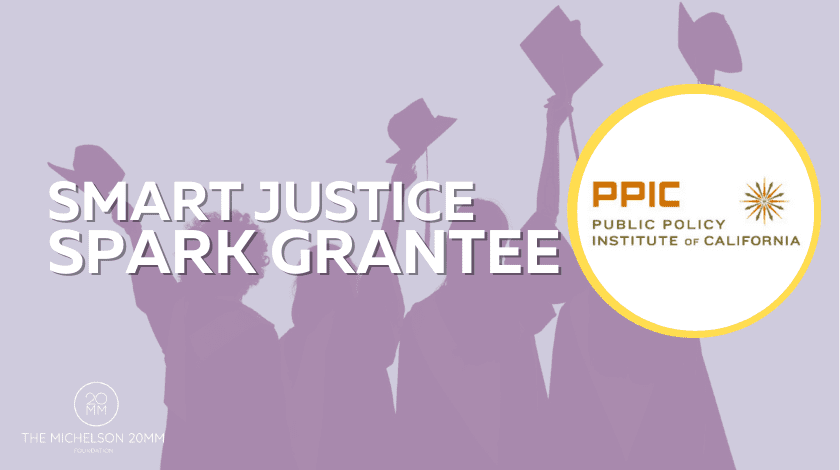By June 2023, the California Department of Corrections and Rehabilitation (CDCR) anticipates 104,409 justice-impacted individuals will be incarcerated in their prisons. As one of the largest prison systems in the United States, CDCR has the potential to help thousands of individuals gain the skills they need for a successful reentry into their communities each year. Furthermore, as a function of the state, CDCR receives funding to conduct rehabilitative programs within the prison system, but the impact of these programs has not been fully analyzed.
To address this knowledge gap, we are proud to award a Spark Grant to the Public Policy Institute of California (PPIC). Over the course of several years, PPIC will evaluate every education, employment, and rehabilitative program offered by the CDCR with the intent of understanding the efficacy of these programs. This analysis will be the first of its kind to examine all of the programs offered by one state prison system, characterize who interacted with the programming in the context of the released population over a five-year period, and bridge the gap between reentry research and research of prison programming. One key element PPIC intends to explore is how racial inequality can impact program outcomes.
PPIC is uniquely positioned to conduct this research due to their existing relationship with the CDCR. Five years ago, CDCR approached PPIC regarding a program evaluation, which was approved as a multiyear initiative in 2021. The agreement includes data sharing from CDCR to PPIC, which PPIC can then overlay into Department of Justice data; the data provided from CDCR details individual programs, who should receive them, their delivery methods, performance measures, and more.
To conduct the analysis, PPIC will also consider the processes that determine enrollment, highlight any inequities embedded within these processes, and identify opportunities to address inequalities. Since only a fraction of CDCR inmates enroll in rehabilitative programs, there is ample opportunity to explore how to increase the accessibility of CDCR’s programming.
The research may also inform programming at local jails. Due to the differences in sentencing lengths–a few months in jails vs longer-term sentences in prisons–many jails do not offer rehabilitative programming to inmates, despite the fact that doing so could assist with recidivism rates. By identifying ways to provide more equitable access to rehabilitative programming, we hope that jail inmates may be able to benefit as well.
Through the Spark Grant, PPIC will enlist the support of research staff as they design program evaluations and begin outreach efforts. Ultimately, the descriptive report will be based on a cohort of nearly 170,000 justice-impacted individuals over the course of five years worth of releases, three years of which also include post-release data. We eagerly anticipate sharing the report once it is completed!
Michelson 20MM is a private, nonprofit foundation seeking to accelerate progress towards a more just world through grantmaking, operating programs, and impact investing. Co-chaired and funded by Alya and Gary Michelson, Michelson 20MM is part of the Michelson Philanthropies network of foundations.
To sign up for our newsletter, click here.
